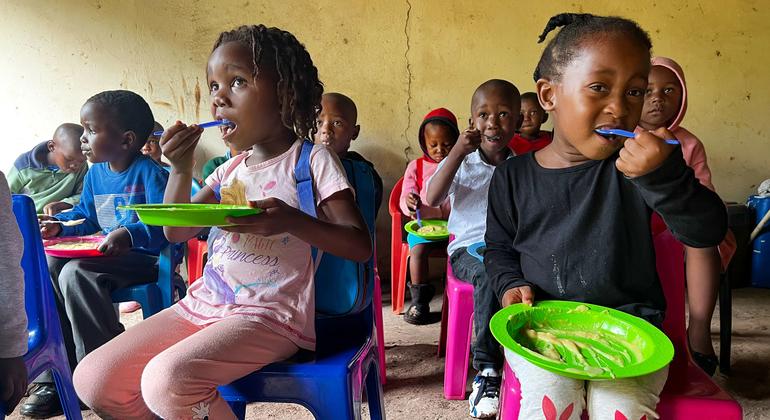First person: surviving abuse to help the neglected children of Eswatini

“In this community, many children do not go to school or study, because they do not have enough food to eat. Many others cannot afford the school fees. I will not be able to send my children to primary school because my husband lost his job.
Some children suffer from a lack of parental love. We have seen neglected children left to find their own food, and at risk of sexual abuse from adults, who can infect them with HIV.
This also happened to me: although my parents did not abandon me when I was a child, I faced abuse from adults including neighbors, my teachers, and the pastor of my church.
Siphiwe Nxumalo, a World Food Program (WFP) volunteer in Eswatini, returned to her country to help orphans and vulnerable children, struggling with poverty and neglect.
A safe place for kids
Before this Neighborhood Watch site was created, this building was full of criminals. They used it to store the stolen things and covered the walls with pictures of torture.
We have created a safe space for children. After we repaired the structure and opened the Care Point, crime in the area dropped. We are not professional teachers, but make use of online resources, such as classes on YouTube, and educational materials.
We want them to develop an entrepreneurial mindset from a very young age, showing them how to avoid widespread crime and create opportunities for themselves.
Hot meals, five days a week
Around 75 children come to this Care site. These centers primarily target children under the age of eight, but we welcome children of all ages, including those whose parents cannot afford to send them to school, children who are disabled, children who need food urgently.
With support from WFP, we are able to provide hot meals, five days a week. Every month, we prepare corn, beans, rice and oil. WFP also gave us agricultural tools, and we have created a vegetable garden, where we grow beans, lentils, lettuce and other vegetables.
I didn’t know, until my friends pointed it out, that I always talk about children, and how to help them. So, I am in the right place. I have found my calling.
Swaziland: an HIV site
Swaziland has the highest HIV prevalence in the world: 27.9 percent of the elderly population lives with the virus; 71 percent of children are orphaned or vulnerable; and one in four children have lost one or both parents to HIV/AIDS.
-
Orphans and vulnerable children are at greater risk of facing violence and abuse, HIV infection, malnutrition, and reduced access to education.
-
Neighborhood Care Sites can be found all over the country. By 2023, WFP supports 800 of these treatment sites with regular food deliveries and agricultural inputs.
-
Community volunteers ensure that children have access to much-needed education and health care, sports activities, and healthy meals.
Find out more about WFP in Eswatini here.










